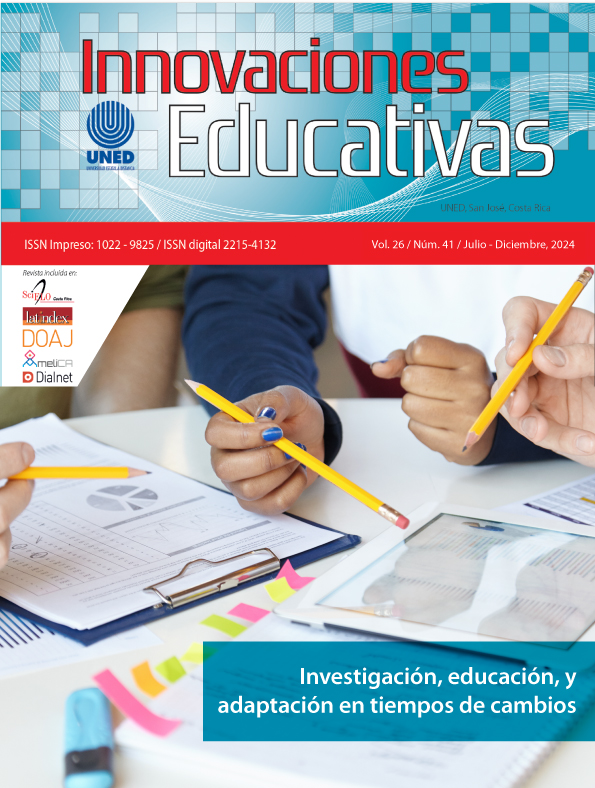Implementation of a Learning Experience Platform with Counseling Professionals: A Proposal from an Active Learning Approach
DOI:
https://doi.org/10.22458/ie.v26i41.5172Keywords:
Virtual Education, Technopedagogical Model, Learning experience platforms, Active learning, OrientationAbstract
This article analyzes the learning experience through the use of a learning experience platform for continuous training processes among members of the Association of Orientation Professionals. The study was conducted with 13 members of the association using a socio-critical methodology and a participatory research design. A technopedagogical design was elaborated based on the diagnostic, design, implementation and evaluation phases of the experience, and was developed through a course incorporated in the Professional Development Program that strengthens socioemotional attention in educational environments. The results show that the Perusall® platform is able to integrate characteristics of the active learning approach. The conclusions highlight the need to develop proposals focused on personalized learning environments, and the Learning Experiences Platform (LXP) is an innovative pedagogical tool that combines recent technologies. The design of Technical Pedagogical Content Knowledge (TPACK) favors strategic and agile planning in the elaboration of didactic proposals and identifies desirable characteristics for future training processes based on the proposed approach, such as greater socio-collaborative spaces, theoretical-practical link with work environments and deepening of critical thinking.
References
Ahumada Figueroa, L. Fernández Cofré, M. B. y González Torres, Á. (2020). Aprendizaje en red: fortaleciendo la colaboración en contextos de competencia. RIL editores.
Ávila, E. (2019). Propuesta de un modelo de formación continua para maestros en servicio del sistema educativo del Estado Plurinacional de Bolivia. Revista Neuronum, 5 (1), 30-58. http://eduneuro.com/revista/index.php/revistaneuronum/article/view/165/152
Cambridge Assessment (2019). Aprendizaje Activo. Cambridge Internacional. https://www.cambridgeinternational.org/Images/579618-active-learning-spanish-.pdf
Castro, H. (2020). Estrategia de formación continua e-learning para la carrera de educación primaria UCR 2020. Proyecto de Actualización Permanente para Docentes de Educación Primaria de la Universidad de Costa Rica. https://www.kerwa.ucr.ac.cr/bitstream/handle/10669/82098/Estrategia%20de%20formacion%20continua%20EP.pdf?sequence=1&isAllowed=y
Gamboa, A. Fallas, M. Ramírez, S. (2021) (XVI). Modelo institucional de la orientación en el sistema educativo público costarricense. Revista Ensayos Pedagógicos, 16, 271-296. https://oaji.net/articles/2021/8084-1625584074.pdf
García-Martínez, J. y González-Sanmamed, M. (2020). La comunicación y la interacción como aspectos clave de los entornos personalizados de aprendizaje: Una perspectiva de estudiantes costarricenses de educación. Revista Electrónica EDUCARE, 24 (3), 1-20. https://www.revistas.una.ac.cr/index.php/EDUCARE/article/view/13173
Equipo técnico Kripton Solid. (2022). ¿Qué es una plataforma de experiencia de aprendizaje (LXP) y cómo se usa? Kripton Solid. Recuperado el 8 de mayo de 2024 de https://kryptonsolid.com/que-es-una-plataforma-de-experiencia-de-aprendizaje-lxp-y-como-se-usa/
Hernández-Sampieri, R. y Mendoza-Torres, C. (2023). Metodología de la investigación: Las rutas cuantitativa, cualitativa y mixta. McGraw-Hill.
Ilvento, M. C. (2018). El sujeto de la orientación vocacional a fines de milenio: entre la transformación educativa y la transformación de los procesos productivos. Cuadernos de Humanidades, (12). https://portalderevistas.unsa.edu.ar/index.php/cdh/article/view/586
Jara, I. y Ochoa, J. (2020). Usos y efectos de la inteligencia artificial en educación. Banco Interamericano de Desarrollo https://ie42003cgalbarracin.edu.pe/biblioteca/LIBR-NIV331012022134652.pdf
Koehler, M., Mishra, P., Bouck, E., DeSchriver, M., Kereluik, K., Shin, T. y Wolf, L. (2011). Deep-Play: Developing TPACK for 21st Century Teachers International Journal of Learning Technology, 6 (2), 146-163.
Leasure, D., Apple, D.,Beyerlein, S., Ellis, W. y Utschig, T. (2020). A System for Learning by Performance (LxP). International Journal of Process Education, 11(1), 101-128. https://www.researchgate.net/publication/349464580_A_System_for_Learning_by_Performance_LxP
Mahmoudi-Dehaki, M. Chalak, A. y Heidari, H. (2021). The Impact of Learning through Management System vs. Learning through Experience Platform on Exam Results of Digital Natives and Digital Immigrants. Journal of Teaching Lenguajes Skills, 40 (3), 117-157. http://dx.doi.org/10.22099/jtls.2021.39227.2922
Macias, E. López, J. Rarmos, G. y Lozada, F. (2020). Los entornos virtuales como nuevos escenarios de aprendizaje: el manejo de plataformas online en el contexto académico. Rehuso, 5(3), 62-69.https://revistas.utm.edu.ec/index.php/Rehuso/article/view/2603/2752
Meléndez, M. (2021). La tecnología de la información y la educación del futuro: Seis factores tecnológicos. Advanced Sciences Index, 158, 80-91. https://sistemas.acis.org.co/index.php/sistemas/article/view/146/111
Navarrete, G. Morán, C. Guamán, M. Arteaga, M. y Torres, J. (2019). El E-Learning como herramienta para la educación continua: una respuesta a la formación profesional en el Ecuador. Risti, 18, 14-25. https://recursos.educoas.org/sites/default/files/VE16.534.pdf
Nivela-Cornejo, M., Echeverría-Desiderio, S., Otero-Agreda, O. (2020). Estilos de aprendizaje e inteligencia artificial. Polo del conocimiento, 5 (09), 222-253. https://dialnet.unirioja.es/servlet/articulo?codigo=7554412
Ormaza, P. (2019). Orientación Vocacional y Profesional, garantía de derechos y construcción de proyectos de vida. UNEMI, 12(30). https://dialnet.unirioja.es/servlet/articulo?codigo=7067113
Quesada, M. (2018). Estrategia de mediación pedagógica para la capacitación en entornos virtuales de aprendizaje en la Universidad Técnica Nacional [Trabajo de grado para optar por el título de Magíster en Tecnología Educativa con énfasis en producción de medios instruccionales, Universidad Estatal a Distancia]. Repositorio UNED. https://repositorio.uned.ac.cr/reuned/handle/120809/1792
Ramírez, J. (2016). Orientación Laboral y Gestión de Empleo: Aportes para la Educación Superior Costarricense. Pro Veritatem, 2,85-106. https://dokumen.tips/download/link/orientacin-laboral-y-gestin-de-empleo-aportes-para-la-.html
Rojas, A., Briseño, M. y Gómez, M. (2015). Factores de deserción de cursos virtuales para formación docente en Costa Rica. Revista Q. 10, (19),1-22. https://www.researchgate.net/publication/307851166_Factores_de_desercion_de_cursos_virtuales_para_formacion_docente_en_Costa_Rica
Silverman, M. (1998). Active Learning. 101 strategies to Teach Any Subject. Allyn & Bacon.
Soto, A., Briseño, M. y Gómez, M. (2016). Actores de deserción de cursos virtual para formación docente en Costa Rica. Revista Q , 10(19). https://repository.upb.edu.co/handle/20.500.11912/6872
Suárez Ortega, M. y Sánchez García, M. F. (2018). Orientación para la construcción del proyecto profesional. UNED - Universidad Nacional de Educación a Distancia.
Urteaga, I., Siri, L. y Garófalo, G. (2020). Predicción temprana de deserción mediante aprendizaje automático en cursos profesionales en línea. RIED. Revista Iberoamericana de Educación a Distancia, 23(2), 147-167. http://dx.doi.org/10.5944/ried.23.2.26356
Vargas-Hernández, E., Salas-Pérez, K. y Sánchez-López, A. (2022). Desarrollo histórico y conceptual de la orientación vocacional en Costa Rica. Revista Costarricense de Orientación, 1(1). 1-18. https://rco.cpocr.org/index.php/rco/article/view/20/33
Villareal, C. (2020). La Orientación es educación social. EdiNexo.
Villegas-Ch, W., Román-Cañizares, M. y Palacios-Pacheco, X. (2020). Improvement of an Online Education Model with the Integration of Machine Learning and Data Analysis in an LMS. Applied Sciences, 10(15), 5371. https://doi.org/10.3390/app10155371
Zumba, G. R., Mora Aristega, A. M. y Sánchez Soto, M. A. (2021). Estrategias y metodologías de enseñanza para el aprendizaje activo en la Educación Superior. Editorial Tecnocientífica Americana.
Downloads
Published
How to Cite
Issue
Section
License
Copyright (c) 2024 Innovaciones Educativas

This work is licensed under a Creative Commons Attribution-NonCommercial-NoDerivatives 4.0 International License.

